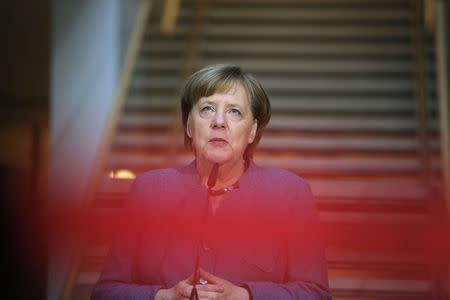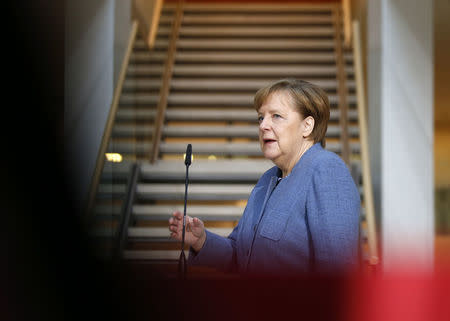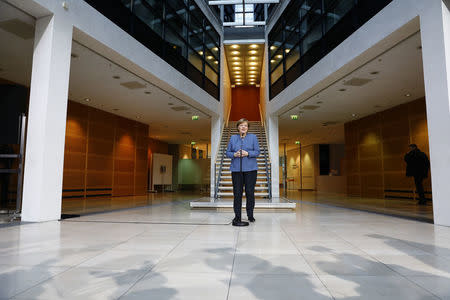Merkel: German coalition talks tough, Sunday finish uncertain
By Michelle Martin and Andreas Rinke
BERLIN (Reuters) - German Chancellor Angela Merkel said on Sunday that her conservatives faced tough negotiations with the Social Democrats (SPD) as they strive to form a ruling coalition, and it was unclear when they would be able to wrap up the talks.
More than four months after a national election, Europe's largest economy and pre-eminent power broker is in political paralysis, causing concern among investors and partner countries that policymaking on issues such as Britain's looming departure from the European Union and euro zone reform may be held up.
The conservatives and SPD had set themselves a Sunday deadline to agree on renewing the "grand coalition" that has governed since 2013 but some politicians said the discussions could run into Monday or Tuesday. Even then, SPD grassroots members will still need to vote on any deal.
"It's not yet possible to say how long it will last - we did good groundwork yesterday but there are still important issues that need to be resolved," Merkel, in office for 12 years, said before heading into negotiations at the SPD headquarters.
Asked on ARD television if the negotiations could still fail, senior conservative Reiner Haseloff said: "I don't think so. I hope not. I can't think of any topic that is insurmountable."
The parties agreed on Sunday to invest more than two billion euros in social housing by 2021, to spend up to 12 billion euros on expanding broadband and to channel 33 billion euros to municipalities for various projects including childcare.
They have also ticked off migration, energy and agriculture in recent days too but the most contentious issues - labour rules and healthcare have yet to be resolved.
As he arrived for talks, SPD leader Martin Schulz said the sides had edged closer on many issues but remained at odds over an SPD demand to abolish fixed-term employment contracts and its call to replace Germany's dual public-private healthcare system with one insurance system for all.
HEALTH AND LABOUR
Healthcare and labour policy are crucial for the SPD as it tries to convince its 443,000 members - many of whom oppose forming another awkward partnership with Merkel after their party suffered its worst postwar result in September's election.
"I think agreements are possible but they still haven't been reached," Schulz said. "Ultimately it's necessary to take the time you need to create a stable foundation for a stable government."
The conservatives have rejected SPD calls for sweeping reform of health insurance and talks are now expected to focus on improving public healthcare, such as by changing billing rules for doctors, who earn more by treating private patients.
In labour market policy, Merkel's bloc does not want to ban fixed-term contracts, but has offered to prevent the repeated renewal of such contracts as a compromise.
SPD negotiator Manuela Schwesig, aware of the need to push through distinctive SPD policies to sell the deal to the party at large, said: "We've promised our members that we'll negotiate until the other side squeals, and we'll do that."
The parties plan to negotiate until midnight (2300 GMT) at the latest on Sunday and if they do not manage to conclude talks by then, they will resume at the SPD headquarters on Monday, sources said.
If the parties negotiate late on Sunday night, it could be too late to call together the 91 politicians who need to be there to be informed about a coalition deal before a deal is made public.
(additional reporting by Thorsten Severin; Writing by Michelle Martin; Editing by Kevin Liffey and Toby Chopra)




